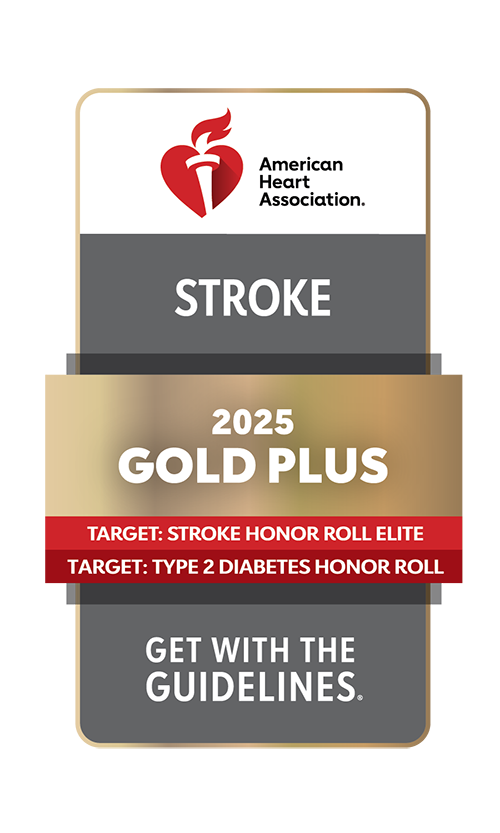Stroke care in Manchester, New Hampshire
The moments following the onset of stroke symptoms are critical, and we treat you with the urgency your condition requires.
At Catholic Medical Center, we are committed to helping you and your loved ones during and after a stroke. Our specialists are trained to promptly treat your stroke symptoms with evidence-based interventions that work to stop strokes and prevent them in the future.
Signs of a stroke
If you know the warning signs of a stroke, you can be better equipped to seek immediate care if one occurs. A stroke can cause a variety of symptoms, such as:
- Abrupt severe headache
- Being unaware of body parts
- Depression
- Dizziness
- Issues speaking
- Lack of bowel or bladder control
- Loss of balance and coordination
- Numbness
- Problems with thinking or attention
- Sudden bursts of emotion
- Sudden trouble seeing
- Trouble swallowing
- Unexpected pain
- Walking difficulties
- Weakness or paralysis on one side
Our stroke treatments and services
We work to ensure that you not only have as much information as possible regarding stroke symptoms and risk factors, but that you also have access to effective, efficient stroke care.
Risk factors
A stroke is an urgent medical emergency that occurs when blood stops flowing to part of the brain. While risk factors for stroke are always concerning, they fall into two categories. There are risk factors that cannot be managed or changed, and there are manageable risk factors.
Inherent stroke risk factors
Risk factors you are born with include:
- Age — As your age increases, so does your risk for a stroke.
- Family disease — Having a personal history of diabetes or smoking puts you at risk of a stroke.
- Gender — Men are at a higher risk for stroke than women.
- Race — African Americans are at a higher risk for stroke than other groups.
Manageable stroke risk factors
In order to combat increasing stroke risks, you can:
- Cease smoking
- Consume a low-fat diet
- Control your weight
- Eat a low-sodium diet
- Exercise regularly
- Find out if you have atrial fibrillation (AFib)
- Keep your cholesterol low
- Manage your diabetes
- Regulate your blood pressure
- Use alcohol only in moderation
B.E. F.A.S.T.
If have any stroke risk factors, it's important to educate yourself and your family about potential warning signs. Not all warning signs occur in every instance, and sometimes they go away before they return. B.E.F.A.S.T. is an easy way to remember the warning signs of stroke.
- Balance — Have you experienced poor balance, headache or dizziness?
- Eyes — Do you have blurred vision?
- Face — Are you experiencing sudden numbness, weakness or drooping of the face?
- Arms — Have you felt weak or numb in one arm or leg?
- Speech — Are you suddenly confused or having trouble speaking?
- Time — Time to call 911.
If you think you or someone close to you may be having a stroke, please call 911 immediately.
Stroke treatment
As a longstanding partner of the American Heart Association and American Stroke Association, we are committed to providing exceptional stroke diagnosis and treatment.
Medication is an important component of successful stroke care. Depending on your condition and level of overall wellness, you may be able to receive tissue plasminogen activator (tPA), a clot-busting medication that can prevent stroke damage. This medication typically needs to be administered within the first few hours after the onset of symptoms. Aside from medication management, our stroke program also includes:
- Appropriate specialist referrals
- Continuity of care through intensive care and stroke units
- Early stabilization of brain and body functions
- Education about preventing future complications, such as pneumonia, bladder infections, muscle changes and skin breakdown
- Emergency care in our leading-edge emergency room
- Inpatient and outpatient rehabilitation
- Recovery guidance
Telestroke ambulance program
Our telestroke ambulance program is led by ambulance crews who can contact expert neurologists to virtually consult on your care while you or your loved one is on the way to the hospital.
Brain injury and stroke rehabilitation
Traumatic brain injury (TBI), also known as intracranial injury, occurs when an external force traumatically injures the brain. Our compassionate rehabilitation team provides comprehensive inpatient and outpatient services to help increase your independence and chances for positive recovery outcomes. By working closely with you and your loved ones, we will develop a program designed to promote the best possible quality of life.
Acute inpatient services
Early intervention is critical for recovery from TBI. During inpatient care, we work to ensure you receive appropriate care from a skilled team of rehabilitation professionals, including:
- Nurse case management
- Occupational therapists
- Physical therapists
Outpatient services
Our outpatient stroke and brain injury rehabilitation program works to continue the progress established during inpatient care through several resources, including:
- Community reentry program
- Nurse case management
- Occupational therapy
- Physiatry
- Physical therapy
- Speech and language therapy
